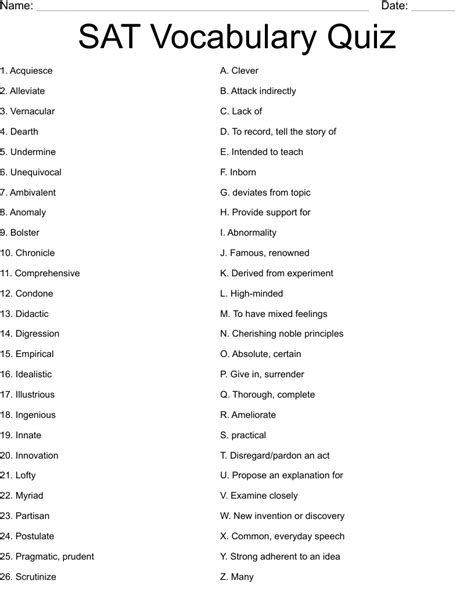Prepare for the SAT by mastering the essential vocabulary that will elevate your score. This comprehensive quiz will challenge your knowledge of frequently tested SAT words and help you build a robust foundation for success.

Assessing Your SAT Vocabulary
According to the College Board, approximately 9% of SAT questions test your vocabulary skills. Therefore, developing a strong vocabulary is crucial for maximizing your score. This quiz will provide you with an accurate assessment of your current vocabulary proficiency and identify areas for improvement.
Quiz Instructions
- Read each question carefully and choose the best answer from the options provided.
- There is only one correct answer for each question.
- Answer all questions to the best of your ability.
Questions
-
Abrogate means to:
(A) cancel
(B) create
(C) support
(D) delay -
Concatenate means to:
(A) connect
(B) separate
(C) doubt
(D) repeat -
Ephemeral means:
(A) permanent
(B) temporary
(C) beautiful
(D) ugly -
Fastidious means:
(A) careless
(B) tidy
(C) lazy
(D) rude -
Gregarious means:
(A) shy
(B) sociable
(C) arrogant
(D) boring -
Magnanimous means:
(A) selfish
(B) generous
(C) cruel
(D) humble -
Obsequious means:
(A) respectful
(B) rude
(C) flattering
(D) honest -
Pedantic means:
(A) intelligent
(B) boringly detailed
(C) persuasive
(D) fair -
Quixotic means:
(A) realistic
(B) idealistic
(C) foolish
(D) cruel -
Soporific means:
(A) stimulating
(B) boring
(C) painful
(D) funny
Answer Key
- A
- A
- B
- B
- B
- B
- C
- B
- B
- B
Common Mistakes to Avoid
- Confusing words with similar sounds or spellings: Be aware of words that sound or look alike but have different meanings (e.g., confidant vs. confident, principle vs. principal).
- Misunderstanding connotations: Words can have positive or negative connotations, so ensure you understand the subtle nuances of each word.
- Ignoring context: The meaning of a word can shift depending on the context in which it is used. Pay attention to the surrounding sentence to determine the intended meaning.
Step-by-Step Approach to Building SAT Vocabulary
- Read widely: Engage with various texts, including fiction, non-fiction, newspapers, and magazines, to encounter a diverse range of vocabulary.
- Use flashcards: Create flashcards for unfamiliar words, including their definitions, examples, and synonyms. Review them regularly to reinforce your knowledge.
- Practice with practice tests: Take practice tests to familiarize yourself with the format and question types and to identify areas for improvement.
- Consult a thesaurus: Use a thesaurus to explore synonyms and antonyms for words you encounter, expanding your vocabulary and depth of understanding.
- Seek professional help: Consider seeking guidance from an SAT tutor or teacher who can provide personalized support and expert insights.
Why SAT Vocabulary Matters
- Higher scores: A strong vocabulary is directly correlated with higher SAT scores, particularly in the Reading and Writing sections.
- Improved academic performance: Mastering SAT vocabulary not only enhances test scores but also improves your overall academic performance in reading, writing, speaking, and listening.
- Professional success: A rich vocabulary is essential for effective communication and comprehension in various professional settings, from writing reports to delivering presentations.
How to Generate Ideas for New Applications of Vocabulary
- Create a vocabulary word generator: Utilize creative thinking and word-play techniques to come up with new words that express specific concepts or ideas.
- Engage with a vocabulary chatbot: Use artificial intelligence to generate vocabulary-rich sentences and phrases, providing opportunities to apply new words in context.
- Develop a vocabulary-based game: Convert vocabulary learning into an engaging and interactive experience by creating games that test your understanding and encourage memorization.
- Collaborate with peers: Form study groups or online forums with fellow SAT aspirants to exchange vocabulary knowledge and brainstorm innovative applications.
Useful Tables
Table 1: Common SAT Vocabulary Prefixes
| Prefix | Meaning | Example |
|---|---|---|
| anti- | against | anti-war |
| inter- | between | intercultural |
| over- | excessive | overconfident |
| sub- | below | subconscious |
| un- | not | untidy |
Table 2: Common SAT Vocabulary Suffixes
| Suffix | Meaning | Example |
|---|---|---|
| -ance | quality of | elegance |
| -ity | state of | maturity |
| -ment | result of | statement |
| -tion | action of | education |
| -y | quality of | funny |
Table 3: Synonyms for Common SAT Vocabulary Words
| Word | Synonyms |
|---|---|
| abrogate | cancel, abolish, nullify |
| gregarious | sociable, outgoing, friendly |
| magnanimous | generous, forgiving, merciful |
| pedantic | boringly detailed, nitpicking, finicky |
| soporific | boring, drowsy, sleep-inducing |
Table 4: Antonyms for Common SAT Vocabulary Words
| Word | Antonyms |
|---|---|
| ephemeral | permanent, lasting, durable |
| fastidious | careless, sloppy, untidy |
| obsequious | disrespectful, rude, insolent |
| quixotic | realistic, practical, down-to-earth |
| soporific | stimulating, exciting, invigorating |
